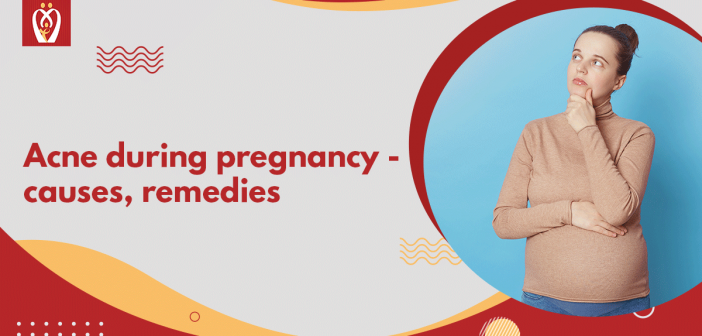It’s a common misconception that pregnant women’s complexions become softer and more radiant, but this isn’t always the case because of the increased oil production. Acne during pregnancy has no known origin, although physicians believe that they are produced by the same hormones that trigger breakouts throughout adolescence. Specifically, androgens, a type of hormone.
Causes
Pregnancy is a time when your hormones vary greatly. Progesterone, in particular, plays a role in the onset and progression of acne during pregnancy. High amounts of progesterone activate your skin’s oil glands and cause them to generate more oil, preparing the uterus to nourish a growing baby. Acne during pregnancy can occur if the oil clogs your pores.
The first trimester is the most likely time for acne to begin, but it can occur at any time during pregnancy. During the third trimester, when hormones are at their peak, there may be another flare-up. Breakouts aren’t a problem for all expectant mothers. For some ladies, pregnancy even helps to clear up existing acne problems. Others will see no difference in your skin, whether that be for the better or worse.
Acne during pregnancy can range from mild to severe, depending on the individual. Acne sufferers are more likely to experience it during pregnancy. Pregnancy acne is more likely if you’ve had acne in the past, but the underlying causes of acne flare-ups during pregnancy.
Acne during pregnancy can be caused by factors other than an increase in androgen levels. Acne is fought in part by the immune system, which changes and is partly repressed during pregnancy. Pregnancy can also cause an increase in stress hormone levels, which can lead to outbreaks or worsen existing acne.
Self-care is the first step in treating acne during pregnancy
- Cleanse troublesome areas with a mild cleaner. Use a mild soap and warm water to wash your face twice a day with your hands. Products like facial washes, astringents and masks can irritate the skin, which can lead to an increase in the severity of acne. Washing and scrubbing too much can also irritate the skin and cause it to become inflamed.
- Shampoo your hair on a regular basis. Shampoo your hair every day if you have a tendency to get pimples around your hairline.
- Spots shouldn’t be picked or squeezed. Infection or scarring may result as a result of this practice.
- Avoid aggravating stimuli. Cosmetics that are too oily or greasy might clog pores and cause breakouts. Use water-based or noncomedogenic products, which are less prone to trigger acne.
- Keep an eye on everything that comes into contact with your body. Your hair should be clean and out of your face. Make sure you don’t place anything, including your hands, directly on your face. When you’re working up a sweat, wearing clothing or headgear that is too tight can be uncomfortable. Acne can be exacerbated by sweat and oil.
Treatment
If you’re pregnant, acne can be treated, but care must be given while selecting remedies. Pregnant or lactating women should not take some acne treatments (such as isotretinoin). Pregnant women should avoid even some topical medicines. Before taking any acne treatment solution, including those marketed over-the-counter, be sure to check with your doctor.
There are a few acne-fighting serums that are safe for pregnant women:
- Salicylic acid
- Azelaic acid
- Benzoyl peroxide
- Laser treatment (It’s best to check with your doctor first because some patients may require a numbing treatment that’s not normally prescribed)
Medications unsafe to use for acne during pregnancy
There have been reports of significant birth abnormalities due to the use of several drugs during pregnancy. The drugs that should not be taken are
- Isotretinoin
- Tazarotene
- Spironolactone
It’s debatable whether or not diet can help keep acne at bay. Acne preventive foods and nutrients such as dairy, chocolate, glycemic load, dietary fibre and healthy fats, antioxidants such as vitamin A and zinc were the focus of a 2016 study. A diet rich in glycemic load and dairy products may be linked to acne, according to the study. We don’t know how omega-3 fatty acids, antioxidants, dietary fibre, vitamin A, zinc, and iodine help in clearing out acne during pregnancy.
Home cures for acne are tempting, but so far there is no scientific evidence that items like apple cider vinegar, Milk of Magnesia (magnesium hydroxide), toothpaste, or other home treatments may clear up acne.
That being said, acne that first emerges during pregnancy usually disappears when the baby is born and hormone levels return to normal. As mentioned before, several acne drugs may not be suggested for breastfeeding women, so check with your doctor before taking them again.
Nurturey’s PinkBook helps you in managing your pregnancy and child health. If you are looking for a pregnancy book online, then this is your go-to.




